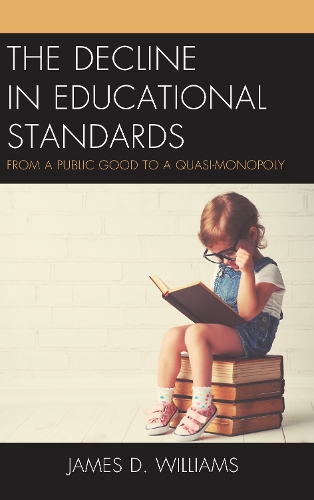
The Decline in Educational Standards: From a Public Good to a Quasi-Monopoly
(Paperback)
Publishing Details
The Decline in Educational Standards: From a Public Good to a Quasi-Monopoly
By (Author) James D. Williams
Bloomsbury Publishing PLC
Rowman & Littlefield Publishers
15th April 2019
United States
Classifications
Professional and Scholarly
Non Fiction
Educational administration and organization
Educational strategies and policy
379.1580973
Physical Properties
Paperback
304
Width 151mm, Height 217mm, Spine 18mm
404g
Description
The Decline in Educational Standards: From a Public Good to a Quasi-Monopoly is about the commodification of education and the factors that have changed education from a public good into a commodity over the last 50 years. When we look at todays education, we see that academic standards in public education have been declining for decades even as education funding has reached nearly a trillion dollars per year to fund such failed programs as No Child Left Behind and Common Core. Simultaneously, tuition and fees at public universities have increased nearly 2000 percent over the last 30 years, and student loan debt is now a staggering $1.5 trillion. Quite simply, education has become big business.
This book examines the various issues associated with the commodification of education, especially neoliberalism and privatized Keynesianismwhat they are, how they developed, and how they have affected education and public policy. It argues that neoliberalism and the related socioeconomic shift to debt-based consumerism are at the center of commodification, leading to a significant decline in the exchange value of a college degree. It also argues that we cannot understand the changes in our public and higher education systems without examining the historical, social, economic, and political factors that have essentially created an education system that is significantly different from what it was in the not so distant past.
Reviews
The Decline in Educational Standards is a well-researched, cogent, and compelling indictment of education in the U.S. James Williams challenges us to "have the will to effect the changes necessary to rescue a failed system. -- Ralph Voss, Ph.D., Professor Emeritus, University of Alabama
What has happened to American higher education Many have bemoaned the declining standards, skyrocketing student debt, and overly politicized faculty, but how did we get here Why are classes on topics like the Simpsons seemingly more common than required history classes Who benefits from sharply increasing tuition In this ambitious, provocative, wide-rangingand well-researchedbook, Dr. Williams addresses the history and predicament of American higher education from historical, political, philosophical, and economic perspectives. The book will challenge your thinking and explode myths. It will also provide some suggestions about how to save the academy. -- Jeff Greene, PhD, Virginia Commonwealth University
Professor Williams is to be congratulated for providing an accurate, timely analysis of the American education system. In a reader-friendly fashion, he explains the commodification of education and the associated decline in educational standards. Numerous issues affecting the educational system in the USA are addressed, as well as possible policy measures to improve public and higher education. This is a very stimulating book that should be read by everyone who wants to understand the current state of American education. -- Ioana Alexandra Horodnic, PhD, Marie Curie Research Fellow, Sheffield University Management School, Sheffield, UK
Author Bio
James D. Williams holds a doctorate in rhetoric and linguistics from the University of Southern California and has published more than a dozen books on education, linguistics, and rhetoric. He has held faculty positions at UCLA, The University of Southern California, The University of North Carolina, Chapel Hill, and is a founding faculty member at Soka University in California.
